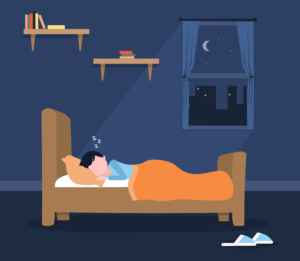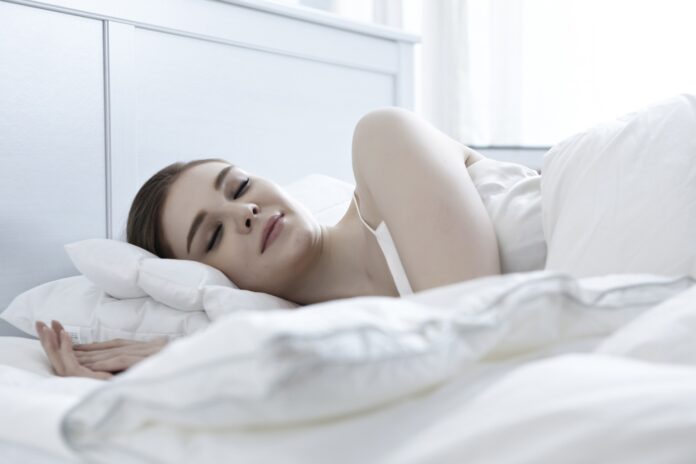Struggling with weight loss can be a frustrating and demoralizing experience. It often involves a constant battle with cravings, temptations, and self-doubt. Sticking to a healthy diet and exercise routine can be difficult, and setbacks can be disheartening. The constant pressure to lose weight can also lead to feelings of inadequacy and self-consciousness.
In this often long journey towards weight loss, where multiple factors have to be factored in,
One factor we may overlook in the weight loss journey is restful sleep.
There is a strong link between sleep and weight loss. Sleep plays a crucial role in regulating the hormones that control hunger and fullness. When you don’t get enough sleep, your body produces more of the hormone ghrelin, which increases your appetite. At the same time, it produces less of the hormone leptin, which helps regulate your appetite and make you feel full. This can lead to increased cravings for unhealthy foods and a reduced ability to feel satisfied after eating, triggering the need to eat more.
Poor sleep has been linked to an increased risk of weight gain and obesity. When you’re well-rested, you’re more likely to have the energy and motivation to exercise, which can help you burn more calories and lose weight. This can make it easier to stick to a healthy eating plan and avoid overeating, which can also help with weight loss.

10 Simple Ways to sleep better
- Create a relaxing bedtime routine – This can include activities such as taking a warm bath, reading a book, or listening to calming music. This helps signal to your body that it is time to wind down and prepare for sleep.
- Keep a consistent sleep schedule – Maintaining a consistent sleep schedule is important to getting good quality sleep. Going to bed and waking up at the same time every day can help regulate your body’s natural circadian rhythms and promote a healthy sleep-wake cycle. This can help you fall asleep more easily at night and feel more rested during the day.
- Create a sleep-friendly environment – Keep the room cool, dark, and quiet. Adjust the thermostat to a comfortable temperature (around 60-70 degrees Fahrenheit), close the curtains or blinds to block out light, and use earplugs or a white noise machine to block out any unwanted noise. Make sure the bed is comfortable and inviting. Invest in a high-quality mattress and pillows that provide proper support, and use soft, breathable bedding such as 100% cotton sheets and a lightweight comforter.
- Avoid heavy meals and alcohol before bedtime – It is advised to avoid eating heavy meals and drinking alcohol close to bedtime for several reasons. First, heavy meals can cause indigestion and discomfort, making it difficult to fall asleep. Alcohol, on the other hand, can make you feel drowsy initially, but it can disrupt your sleep later on in the night. This is because alcohol interferes with your body’s natural sleep-wake cycles and can cause you to wake up more frequently during the night.
- Avoid caffeine and nicotine close to bedtime – Caffeine is a stimulant that can increase alertness and energy levels, while nicotine is a stimulant that can increase heart rate and blood pressure. Consuming these substances close to bedtime can make it difficult to relax and fall asleep, leading to restless and disrupted sleep. Instead, try to avoid caffeine and nicotine at least 6-8 hours before bedtime to allow the body to wind down and prepare for sleep.
- Exercise regularly – Regular exercise can help you sleep better by reducing stress and anxiety, improving your overall physical health, and making it easier for you to fall asleep and stay asleep at night. Exercise also promotes the release of endorphins, which can help improve your mood and promote feelings of relaxation, both of which can contribute to better sleep. It’s important to note that the type and intensity of exercise most beneficial for sleep may vary from person to person. Some people may find that a moderate-intensity workout, such as a brisk walk or a yoga class, is enough to help them sleep better, while others may need a more intense workout, such as a high-intensity interval training (HIIT) session or a long run, to see similar benefits. Finding the right balance between exercising too little and exercising too much is essential, as both can negatively impact your sleep.
- Manage stress and anxiety: Stress and anxiety can interfere with your ability to fall asleep and stay asleep. Try incorporating relaxation techniques such as deep breathing, meditation, yoga, or progressive muscle relaxation into your bedtime routine to help reduce stress and promote a sense of calm.
- Avoid looking at screens close to bedtime – This is because the blue light emitted by screens can interfere with the production of melatonin, a hormone that helps regulate sleep. Looking at screens close to bedtime can also stimulate the brain and make it harder to relax and fall asleep. It is recommended to avoid using electronic devices for at least an hour before bedtime to ensure a good night’s sleep.
- Consider incorporating natural sleep aids – Herbal remedies, such as melatonin supplements, herbal teas, and essential oils, can help improve sleep quality without medication use. Melatonin supplements can help regulate the body’s natural sleep-wake cycle, while herbal teas, such as chamomile or valerian, can have a relaxing effect on the body. Essential oils, such as lavender or vanilla, can be used in a diffuser or added to a warm bath to create a soothing atmosphere and promote sleep. It is important to consult a healthcare provider before using any natural sleep aids to ensure they are safe and effective for individual needs.
- Consider seeking professional help – If sleep difficulties persist despite implementing these strategies, it may be helpful to seek professional help. A healthcare provider or sleep specialist can assess for underlying medical conditions and provide personalized treatment options. They can also offer support and guidance on managing sleep disorders and improving sleep quality. Seeking professional help can be an important step in improving overall health and well-being.
In conclusion, implementing healthy sleep habits and techniques can improve sleep quality and overall health. Creating a good lifestyle is ultimately in your hands. It involves making healthy choices and taking actions that promote overall well-being. This includes prioritizing sleep, eating a balanced diet, staying active, managing stress, and maintaining strong social connections. You can improve your health and happiness by taking control of your lifestyle and making positive changes.
